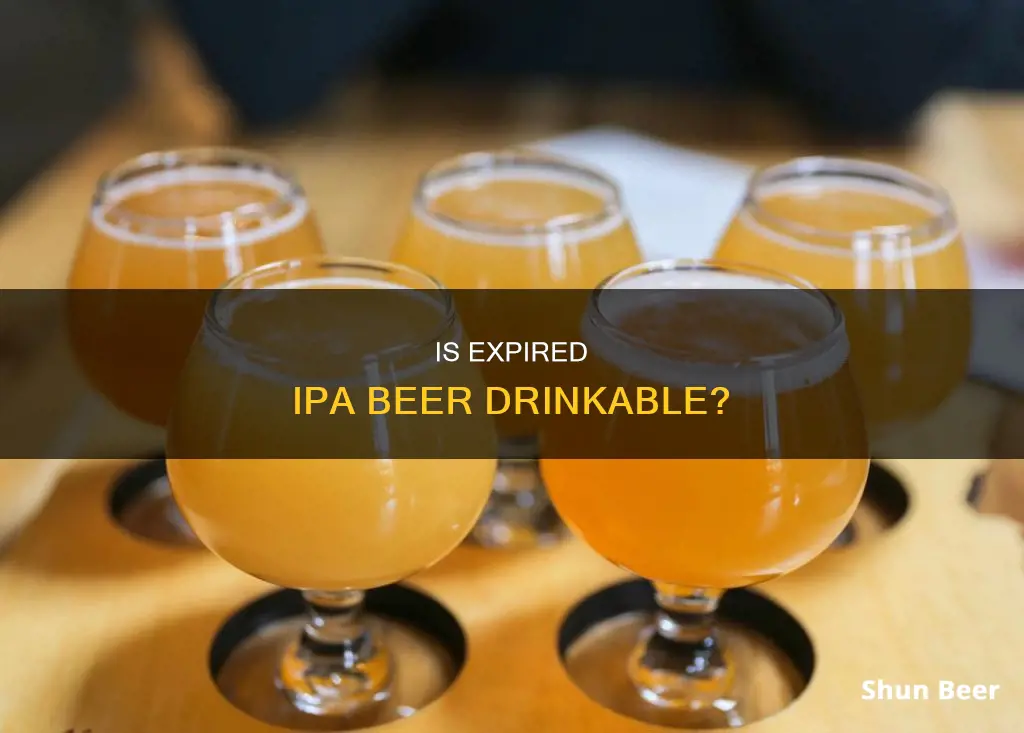
Beer lovers, rejoice! While beer does expire, it is still safe to drink. The fermentation process, low pH level, and alcohol content make it difficult for microorganisms to survive, even if the beer has been sitting on the shelf for years. However, the taste of the beer will change over time, and it may not be as enjoyable. This is especially true for IPAs, which are more sensitive to changes in flavour due to their high concentration of hops. To maintain the best taste, IPAs should be consumed within three weeks to three months of production.
| Characteristics | Values |
|---|---|
| Does IPA beer expire? | Yes, but it won't make you sick. |
| How long does it last? | 3 weeks-3 months for optimal taste. Up to 9 months for drinkability. |
| What happens to the beer? | The flavour and aroma of the beer will degrade over time. |
| What factors impact flavour? | Oxygen, heat, light, and time. |
| How to store beer to maximise shelf life? | Store in a cool, dark place, away from temperature fluctuations. Keep it upright to minimise oxidation. |
What You'll Learn

Is it safe to drink expired beer?
Beer typically has a “best before” date, which is different from a "use by" date. While it is unsafe to consume food past its "use by" date, the former is more of a guideline on quality rather than safety. This means that, in most cases, it is safe to drink beer past its "best before" date. However, the flavour and quality of the beer will degrade over time, especially if it is exposed to oxygen, heat, and light.
Beer is unlikely to make you sick, even if consumed years after its "best before" date, as long as it is sealed and has been stored properly. This is because the fermentation process used in brewing beer, as well as its low pH level and alcohol content, make it difficult for microorganisms to thrive. However, if the seal is broken, the beer will lose its fizz and be exposed to bacteria, which can alter the taste.
The flavour of beer can also be impacted by the type of beer, the packaging, and the storage conditions. For example, IPAs, especially hoppy ones, gradually lose their flavour and aroma over time and are best consumed fresh. On the other hand, richer and higher ABV beers, such as porters and stouts, can improve with age if stored in cool, dark conditions. Canned beer also tends to last longer than bottled beer, as cans prevent light from entering and maintain an airtight seal better.
In summary, while it is generally safe to drink expired beer, the taste and quality may not be the same as intended. To maximise the shelf life of beer, it is recommended to store it in a cool, dark place, upright, and away from temperature fluctuations.
Understanding Beer Screens: The Science Behind the Suds
You may want to see also

How long does beer last?
Beer doesn't spoil in the same way that milk does. It doesn't pose a health risk if consumed past its expiration date. However, its taste will change over time, and it will lose freshness.
Beer is brewed in such a way that it kills off unwanted organisms. Once the beer is fully fermented, it creates an environment in which harmful pathogens or bacteria cannot survive. This is due to the combination of alcohol, the beer's low pH, and the antimicrobial activity of hops. However, other microbes that are not harmful can live in these conditions, and they will affect the beer's taste.
The biggest threat to beer is oxidation. Oxygen interacts with the compounds from malt, yeast, and hops, causing oxidation and a disappointing papery taste. The longer the beer is stored, the worse it gets. Heat speeds up oxidation, so it's best to store beer in a refrigerator. Major changes in temperature—like from an ice-cold cooler to a hot car—make it even worse and can't be reversed.
Light is another factor that affects beer quality. Ultraviolet light causes a chemical reaction in hop compounds, resulting in an unpleasant skunky taste. Beer in clear or light-coloured bottles will be affected the most, so it's best to store beer in brown glass bottles or aluminium cans, which block out UV light.
Most beers should be consumed within 90-180 days or so. However, some beers are meant to be aged, such as barley wines and imperial stouts. These beers can be stored for a couple of years and will develop a sweet, bready, and even toffee-like flavour.
IPAs, in particular, are best consumed fresh. They are more sensitive than other beers due to their high hop content. Hops are susceptible to ultraviolet light, heat, and oxygen, and they will start to lose their flavour-enhancing power over time. IPAs are best consumed within three weeks to three months of production.
Freezing Beer: Is It Still Drinkable?
You may want to see also

How to store beer to maximise shelf life?
Beer is best stored in a cool, dark place, preferably in a refrigerator. If you're storing beer at room temperature, make sure it's not exposed to sunlight. Beer should be stored upright, as this minimises the surface area exposed to oxygen and reduces the formation of yeast rings.
The optimal temperature for storing beer depends on the type of beer. Lighter beers, such as lagers, wheat beers and pilsners, should be stored at cooler temperatures, around 7-10°C. For standard ales, such as pale ales and stouts, the ideal temperature is 10-12°C. Stronger beers, like barley wines and imperial stouts, are best stored at 12-16°C.
It's worth noting that some beers, like wild/sour ales and unpasteurised beers, should be kept refrigerated at all times. Beers with cork seals, on the other hand, shouldn't be refrigerated long-term as it can dry out the cork.
In terms of containers, kegs should be stored in a cool, dry space, away from other foods. Packaged beer should be stored in a dry, cool place, with temperatures between 45 and 55°F (7-16°C) being optimal. Beer can be stored at room temperature, but this will drastically reduce its shelf life.
To maximise the shelf life of unopened beer, it's best to store it in a cool, dark place, just below room temperature or slightly above typical refrigerator temperatures. If you have a refrigerator, it's best to store your unopened beer there, where it will remain at its best quality for up to eight months.
For opened beer, it's important to reseal it with an airtight cap or stopper to reduce oxidation and prevent carbonation loss. However, even with proper storage, opened beer will only stay fresh for a limited time, typically a few hours to a few days.
Understanding Beer Columns: Brewing Process Simplified
You may want to see also

What are the signs of bad beer?
Beer doesn't spoil in the same way that milk does, but it can go bad. Bad beer will not make you sick, but it might taste unpleasant. The most common sign of bad beer is a change in flavour. Over time, beer can become overly sweet, sour, or taste like wet cardboard. Beer can also become "skunky", which is caused by exposure to UV rays and is often described as tasting like a skunk smells.
Another sign of bad beer is a change in texture. If your beer has lost its fizz, this could be a sign that the seal has been broken and the beer has been exposed to oxygen. Oxidation can also cause a stale, cardboard-like taste. Exposure to oxygen is also caused by leaving your beer out after it has been opened or by using a keg, as the pumps push oxygen into the beer.
Heat can also cause beer to go bad. Storing beer in a refrigerator helps to prevent this, but major changes in temperature—such as leaving beer in a hot car—can cause irreversible damage.
Finally, bad beer can sometimes have a vinegary taste. This indicates that bacteria have gotten into the beer.
Beer Distribution in Pennsylvania: A Unique System
You may want to see also

Can expired beer be used for cooking?
Beer is a popular alcoholic beverage, but what happens when it expires? Can it be used for cooking?
The short answer is yes, expired beer can be used for cooking. Beer typically has a very long shelf life due to the fermentation process used in brewing, as well as its low pH level and alcohol content, which make it difficult for bacteria to thrive. Even after the "best by" date, beer can be safely used for cooking as long as the container is intact and the beer does not have an unpleasant odour or taste. However, it is important to note that the flavour, aroma, texture, and carbonation of the beer will deteriorate over time.
When using expired beer for cooking, it is important to consider the type of dish being prepared. Expired beer can be used as a liquid when baking bread, making batter, or cooking sauces, stews, and chilis. It adds an earthy flavour and helps enhance the taste of meats and vegetables. However, it is generally recommended to avoid using skunked beer, as the light interaction with hop compounds produces sulfur compounds that can affect the flavour and aroma of the dish.
While expired beer is safe to use for cooking, it is important to use it in moderation and combine it with other ingredients to mask any unpleasant flavours that may have developed over time. Additionally, it is always a good idea to taste a small amount of the expired beer before using it in your cooking to ensure it hasn't gone bad.
In conclusion, while expired beer may not be pleasant to drink, it can still be used for cooking and adds a unique flavour to various dishes. So, the next time you find a forgotten can of beer at the back of your pantry, don't hesitate to use it in your culinary creations!
Beer Mail: Shipping Alcohol Straight to Your Doorstep
You may want to see also
Frequently asked questions
Drinking expired beer will likely not make you sick, but the taste and quality will be degraded.
IPAs are best consumed within 3 weeks to 4 months of production. However, they can be consumed after this time frame, but the flavour and aroma will not be as intended.
Expired IPA beer is unlikely to make you sick, but the taste may be unpleasant. The beer may develop a skunky, vinegary, or papery taste.
Check for a "best before" date on the packaging. Look out for signs such as a bad aroma, lack of fizz, and excessive sediment at the bottom of the bottle.
Store your IPA beer in a cool, dark, and dry place, preferably in a refrigerator. Keep the beer upright and avoid exposing it to direct sunlight or temperature fluctuations.







